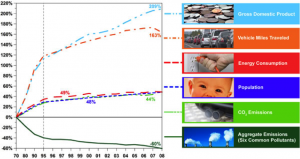Environmentalists critical of electrified America must have mixed emotions this time of the year. It may be the season of good cheer and goodwill toward all, but it is also the time of the most conspicuous of energy consumption. America the Beautiful is at her best in December when billions of stringed light bulbs on buildings and trees turn the mundane or darkness itself into magnificent beauty and celebration.
Holiday lighting is a great social offering—a positive externality in the jargon of economics—given by many to all.
While energy doomsayers such as Paul Ehrlich have riled against “garish commercial Christmas displays,” today’s headline grabbers (Grist, Climate Progress, where are you?) have not engaged a public debate over the issue. Yet holiday lighting is a glaring exception to their goal of reducing discretionary energy usage to help save the world. If holiday energy guzzling is forgiven, why not excuse outdoor heating and cooling, one-switch centralized lighting, and instant-on appliances that “leak” electricity, not to mention SUVs? Prancing around to turn on individual lights or waiting for the paper copier to warm up wastes the scarcest and one truly depleting resource: a person’s time. Surely extra energy use for comfort and convenience has priority over purely celebratory uses of energy.
What about the holiday humbug that celebratory electricity depletes future fossil-fuel supplies, fouls the air, and destabilizes the climate? Good tidings abound!
In terms of proved reserves, world oil reserves are 20 times
[0] greater now than they were when record-keeping began in the 1940s; world gas reserves are over six times
[ii] greater than they were in the 1960s; world coal reserves have risen almost fourfold
[iii] since 1950. Political events can drive supply down and prices up, but the raw mineral resource base is prolific—and expanding in economic terms thanks to an inexhaustible supply of human ingenuity and exploratory capital.

Despite record energy consumption, U.S. air quality is 60% better today than in 1970.
Record energy consumption has been accompanied by improving air quality. The U.S. Environmental Protection Agency reported that urban air quality is almost 60 percent better today than in 1970 in the United States.
[iv] According to the Energy Information Administration, this fall in criteria pollutants was accomplished when fossil energy usage increased by almost a third.
[v] Further air emission reductions are expected, but it will not be accomplished by forcing higher prices or inconvenience levied on consumers. It will be accomplished with market incentives, technological improvement, and regulation based on sound science, not alarmism.
Should good citizens think twice about holiday lighting given global warming and other suspected climate change from increasing atmospheric concentrations of carbon dioxide? Hardly. A moderately warmer, wetter world, whether natural or anthropogenic, such as experienced in the 20
th century, is a better world. Carbon dioxide from the combustion of fossil fuels “greens” the biosphere through the well-documented carbon fertilization effect. But most importantly, the wealth created from affordable, plentiful energy provides the primary means for societies to improve the environment. In the final analysis, wealth is environmental health, which explains why increasing energy usage and environmental improvement have gone hand in hand in the Western world.
There is much to be thankful for this holiday season with our energy economy. But thoughts about the less fortunate should be with us too. An estimated 1.4 billion people do not have electricity for lighting, heating, cooling, cooking, or water purification. A Christmas tree for us is likely to be firewood for those living in energy poverty. For these people, there could be no greater holiday gift than affordable electricity itself, explaining why the developing world has flatly rejected proposals from environmental elites to forsake future energy usage in the quixotic quest to “stabilize climate.”
Energy consumption is good—for comfort, convenience, and even celebration. May one and all in good conscience enliven this holiday season with lights aplenty. With conventional fuels and energy technologies rapidly improving, Americans can look forward to even more energetic celebrations and shared goodwill in the holidays ahead.
[0]Robert Bradley,
Julian Simon and the Triumph of Energy Sustainability (Washington: American Legislative Exchange Council, 2000), pp. 29–30, and Energy Information Administration.
[ii]Robert Bradley,
Julian Simon and the Triumph of Energy Sustainability (Washington: American Legislative Exchange Council, 2000), pp. 29–30, and Energy Information Administration.
[iii] Robert Bradley,
Julian Simon and the Triumph of Energy Sustainability (Washington: American Legislative Exchange Council, 2000), pp. 29–30, and Energy Information Administration.
[iv] Environmental Protection Agency,
Hereand
Here.
[v] Energy Information Administration,
Annual Energy Review
Robert L. Bradley, Jr.——
Bio and Archives
Bradley is CEO and founder of the Institute for Energy Research; an adjunct scholar of the Cato Institute and the Competitive Enterprise Institute in Washington, D.C.; and a visiting fellow of the Institute of Economic Affairs in London. Bradley is also a senior research fellow of the Center for Energy Economics at the University of Texas at Austin, among other honorary affiliations.
Bradley’s most recent book is Capitalism at Work: Business, Government, and Energy (M&M Scrivener Press), which applies the capitalist worldview to corporate and energy controversies. His website Political Capitalism covers this work and two forthcoming books in his trilogy on political capitalism in the energy industry.
Bradley’s other books are: The Mirage of Oil Protection (1989); Julian Simon and the Triumph of Energy Sustainability (2000); Climate Alarmism Reconsidered (2003); and (with Richard Fulmer) Energy: The Master Resource (2004).